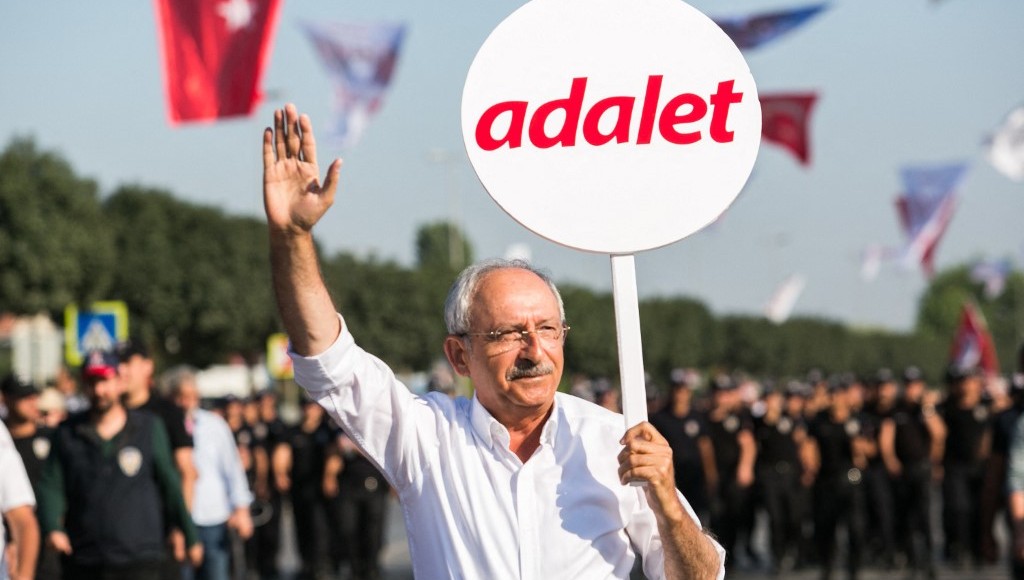Türkmen Terzi
Turkey’s main opposition Republican People’s Party, established by Mustafa Kemal Atatürk, the founder of the Turkish Republic, has rarely been a governing party since the inception of the multiparty system in 1950. The party has instead always controlled the state through the positioning of bureaucratic elites in key institutions. The good times have in recent years drawn to a close for the CHP as Kemalist entities have largely been abolished, to be replaced by Turkish President Recep Tayyip Erdoğan’s Islamist establishments. An important question remains, and this is whether the CHP has ever really been a party of “reformists” defending Turkish democracy as Erdoğan paves the way to an Islamo-fascist regime.
In 2017 CHP leader Kemal Kılıçdaroğlu marched 450 kilometers from Ankara to İstanbul to protest the ruling Justice and Development Party’s (AKP) increasingly widespread crackdown on critics and the arrests following a July 2016 coup attempt. The 72-year-old Kılıçdaroğlu’s efforts in advocating for justice were especially significant since hundreds of thousands of people have been arrested, with another 150,000 having been removed from their jobs under Erdoğan’s post-coup purges. More than 30,000 of Kılıçdaroğlu’s supporters including unionists, various party members, human rights activists and civil society leaders accompanied him in protest under harsh weather conditions. The CHP leader’s historic walk has been compared to Gandhi’s 1930 Salt March. In an opinion piece published in The New York Times, Kılıçdaroğlu clarified that he and others were marching for “democracy, justice, and freedom from fear and authoritarian rule in Turkey.” Indian lawyer Mahatma Gandhi’s nonviolent resistance led the successful campaign for India’s independence from British rule, but millions of Erdoğan’s victims were disappointed the moment Kılıçdaroğlu labeled the Gülen movement a terrorist organization by using the derogatory term “FETÖ” in front of hundreds of thousands of people during a rally. The mass gathering had taken place in İstanbul’s Maltepe district, which was the final destination of the march. Erdoğan uses the term “FETÖ” as he blames the Gülen movement for the coup attempt. Kılıçdaroğlu faced many challenges during his long walk, but his efforts for justice, unfortunately, did not extend to all as he perpetuated Erdoğan’s baseless accusations.
Erdoğan managed to successfully cover up the December 17-25, 2013 corruption case, which implicated members of his inner circle including his son Bilal. The CHP took every opportunity to accuse Erdoğan of theft by referring to the corruption investigation, but the same CHP failed to defend the police and prosecutors who pursued the corruption case.
The CHP ended Erdoğan’s 27-year rule of the İstanbul Municipality when the party’s candidate, Ekrem İmamoğlu, won the İstanbul mayoral seat in a re-run election in June 2019, as well as winning the mayoralties of other key municipalities such as Ankara, İzmir and Adana. It is likely that votes from the pro-Kurdish Peoples’ Democratic Party’s (HDP) led to the CHP’s municipal victory. The AKP is preparing to close down the HDP, but it seems that the CHP is not going to raise its voice to prevent the closure of the pro-Kurdish party.
Although the CHP won key municipalities in the recent election and support for Turkish President Erdoğan declines, election survey results signal alarm bells for opponents in Turkey as the AKP-controlled judiciary and the Erdoğan government continue to seize the assets of opponents. For many years the CHP failed to take any concrete action to protect minorities from Erdoğan’s oppression, but the party is now seen to be loud and vocal in criticism of Erdoğan as he targets powerful secular elites and CHP assets. To express the level of Erdoğan’s lawlessness, Aykan Erdemir, a former CHP lawmaker and senior director of the Turkey program at the Foundation for Defense of Democracies, mentioned in a Foreign Policy article that the Erdoğan government’s seizure of at least $11 billion from nearly 1,000 businesses allegedly linked to the Gülen movement has led to a steady erosion of private property rights in the country.
While the Turkish opposition ignores injustices in the country, democracy in Turkey remains in crisis and under threat. Withdrawal from the Istanbul Convention, an international treaty combatting violence against women and domestic violence, as well as preparing to shut down the pro-Kurdish opposition HDP are two strong signs of Erdoğan’s plans to keep the hungry nation busy with ideological warfare while the Turkish treasury runs dry.
Despite great financial strain, Erdoğan seems determined to completely abolish Atatürk’s republican regime and continue with the dysfunctional executive presidency system. Atatürk removed the Ottoman sultanate and caliphate, transforming Turkey into a secular state after the declaration of the Turkish Republic in 1923. Since Atatürk’s series of political, legal, religious, cultural, social and economic policy changes, the CHP has always been a defender of an elite authoritarian Kemalist regime that excludes a large part of ordinary Turks from public life. It is ironic that Erdoğan, who garnered support from ordinary Turks, largely completed the state capture. Unless the CHP stops pursuing a by-gone era filled with privilege and starts acting as the main opposition, Turkey will fall into complete lawlessness at the hands of vengeful AKP rulers.
Turkish leader Erdoğan has already managed to silence various forces in Turkey during his 19-year-long rule. Turkey’s bureaucratic elite, strong opposition leaders, powerful Kemalist generals, the country’s prestigious liberal universities and Kurdish opposition all bend the knee before Erdoğan. Erdoğan is intensifying his crackdown on ideological opponents, and the current political climate is convenient for him to declare his caliphate.



